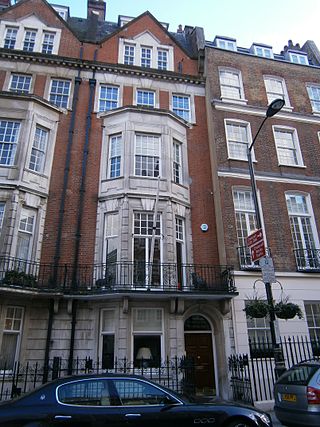
Hughes v Metropolitan Railway Co [1877] is a House of Lords case considered unremarkable for many years until it was resurrected in 1947 by Lord Denning in the case of Central London Property Trust Ltd v High Trees House Ltd in his development of the doctrine of promissory estoppel. The case was the first known instance of the concept of promissory estoppel.

Offer and acceptance are generally recognised as essential requirements for the formation of a contract, and analysis of their operation is a traditional approach in contract law. This classical approach to contract formation has been modified by developments in the law of estoppel, misleading conduct, misrepresentation, unjust enrichment, and power of acceptance.

In the law of contracts, the mirror image rule, also referred to as an unequivocal and absolute acceptance requirement, states that an offer must be accepted exactly with no modifications. The offeror is the master of their own offer. An attempt to accept the offer on different terms instead creates a counter-offer, and this constitutes a rejection of the original offer.

Bell v Lever Brothers Ltd [1931] UKHL 2 is an English contract law case decided by the House of Lords. Within the field of mistake in English law, it holds that common mistake does not lead to a void contract unless the mistake is fundamental to the identity of the contract.

Caparo Industries PLC v Dickman[1990] UKHL 2 is a leading English tort law case on the test for a duty of care. The House of Lords, following the Court of Appeal, set out a "three-fold test". In order for a duty of care to arise in negligence:

Butler Machine Tool Co Ltd v Ex-Cell-O Corp (England) Ltd [1977] EWCA Civ 9 is a leading English contract law case. It concerns the problem found among some large businesses, with each side attempting to get their preferred standard form agreements to be the basis for a contract.

Rose & Frank Co v JR Crompton & Bros Ltd [1924] is a leading decision on English contract law, regarding the intention to create legal relations in commercial arrangements. In the Court of Appeal, Atkin LJ delivered an important dissenting judgment which was upheld by the House of Lords.

English contract law is the body of law that regulates legally binding agreements in England and Wales. With its roots in the lex mercatoria and the activism of the judiciary during the industrial revolution, it shares a heritage with countries across the Commonwealth, from membership in the European Union, continuing membership in Unidroit, and to a lesser extent the United States. Any agreement that is enforceable in court is a contract. A contract is a voluntary obligation, contrasting to the duty to not violate others rights in tort or unjust enrichment. English law places a high value on ensuring people have truly consented to the deals that bind them in court, so long as they comply with statutory and human rights.

In English contract law, an agreement establishes the first stage in the existence of a contract. The three main elements of contractual formation are whether there is (1) offer and acceptance (agreement) (2) consideration (3) an intention to be legally bound.

Brogden v Metropolitan Railway Company (1876–77) L.R. 2 App. Cas. 666 is an English contract law case which established that a contract can be formed by the conduct of the parties.

Learoyd v Whiteley[1887] UKHL 1 is an English trusts law case, concerning the duty of care owed by a trustee when exercising the power of investment.

Lipkin Gorman v Karpnale Ltd[1988] UKHL 12 is a foundational English unjust enrichment case. The House of Lords unanimously established that the basis of an action for money had and received is the principle of unjust enrichment, and that an award of restitution is subject to a defence of change of position. This secured unjust enrichment as the third pillar in English law of the law of obligations, along with contract and tort. It has been called a landmark decision.
The Household Fire and Carriage Accident Insurance Company (Limited) v Grant (1878–79) LR 4 Ex D 216 is an English contract law case concerning the "postal rule". It contains an important dissenting judgment by Bramwell LJ, who wished to dispose of it.

Blackpool & Fylde Aero Club v Blackpool Borough Council [1990] EWCA Civ 13 is a leading English contract law case on the issue of offer and acceptance in relation to an invitation to tender. In it the Court of Appeal of England and Wales decided that tenders and requests for tenders are accompanied by a collateral contract implying that the requestor will give due consideration to any timely bid.

Pitt v PHH Asset Management Ltd [1994] 1 WLR 327 is an English contract law case, which confirmed the enforceability of lockout agreements.

English land law is the law of real property in England and Wales. Because of its heavy historical and social significance, land is usually seen as the most important part of English property law. Ownership of land has its roots in the feudal system established by William the Conqueror after 1066, but is now mostly registered and sold on the real estate market. The modern law's sources derive from the old courts of common law and equity, and legislation such as the Law of Property Act 1925, the Settled Land Act 1925, the Land Charges Act 1972, the Trusts of Land and Appointment of Trustees Act 1996 and the Land Registration Act 2002. At its core, English land law involves the acquisition, content and priority of rights and obligations among people with interests in land. Having a property right in land, as opposed to a contractual or some other personal right, matters because it creates priority over other people's claims, particularly if the land is sold on, the possessor goes insolvent, or when claiming various remedies, like specific performance, in court.

Abbey National Building Society v Cann[1990] UKHL 3 is an English land law case concerning the right of a person with an equitable interest in a home to remain in actual occupation, if a bank has a charge and is seeking repossession. A controversial decision, it held that "actual occupation" entails some degree of permanence, and that if someone buys a property with a mortgage, the bank's charge is to be treated as having priority over any equitable interest.

Kreglinger v New Patagonia Meat & Cold Storage Co Ltd[1913] UKHL 1 is an English property law and UK insolvency law case, concerning whether an exclusivity agreement for buying sheepskins, that accompanied a loan, frustrated the borrower's right to pay off and discharge its debt.

National Westminster Bank plc v Morgan[1985] UKHL 2 is a judicial decision of the House of Lords relating to English contract law and the doctrine of undue influence. The case is most well known for the comments of Lord Scarman about the supposed requirement of "manifest disadvantage" to set aside a contract for undue influence.

CIBC Mortgages plc v Pitt[1993] UKHL 7 is a decision of the House of Lords relating to undue influence. The decision confirmed that a person did not need to suffer "manifest disadvantage" under a transaction in order to challenge it for actual undue influence.

















